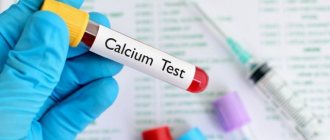Hyperparathyroidism is a disease caused by excessive production of a hormone called parathyroid hormone (PTH). This hormone is produced by the parathyroid glands, small glands located in the thyroid area.
The role of parathyroid hormone is to increase calcium levels in extracellular fluids.
This is achieved by:
- loss of calcium in bones;
- activation of vitamin D3, and thereby increasing calcium absorption in the intestine;
- decreased renal excretion of calcium (at the same time increased excretion of phosphate).
Therefore, hyperparathyroidism is associated with:
- increased levels of parathyroid hormone;
- increased calcium;
- reduced concentration of phosphates.
This is important for diagnosing and treating the disease.
Causes of the disease
The reason for this is clinical manifestations: it hurts in places that have nothing to do with the parathyroid glands.
The parathyroid glands are located near the thyroid gland and there are usually four of them. They are responsible for calcium metabolism. The glands produce parathyroid hormone (parathyroid hormone, PTH), whose task is to supply calcium to the blood.
The work of the parathyroid glands is limited by vitamin D. With age, it is absorbed less and less well, therefore, control deteriorates. Having received complete freedom of action, the parathyroid gland begins to increase the level of calcium in the blood.
Norms and deviations from the norm
The production of PTH depends on the age of the person. So, the hormone norm for older men and women is:
- from 20 to 22 is 12-95 pg/ml;
- 23-70 years – 9.5-75 pg/ml;
- 71 years and older – 4.7-117 pg/ml.
During pregnancy, the rate ranges from 9.5-75 pg/ml.
If the result of the analysis showed that the PTH content is increased, this may indicate primary or secondary hyperparathyroidism as a result of oncology, Crohn's disease, excess vitamin D, renal failure, rickets, colitis, pancreatic tumor. Thus, primary hyperparathyroidism is indicated by an increase in the hormone by 2-4 times, and secondary hyperparathyroidism by 4-10 times. Also in medicine there is the concept of tertiary hyperparathyroidism. It manifests itself in the form of adenoma of the parathyroid glands and an excess of hormone production - the concentration level exceeds the norm by 10 times or more. This occurs when the need for PTH is low and it is produced in excess.
A reduced concentration of parathyroid hormone indicates magnesium deficiency and hypoparathyroidism (primary, secondary), vitamin D deficiency, sarcoidosis, osteolysis (destruction of bone tissue). Also, a similar result is often found in patients who have undergone thyroid surgery.
Nervous system
There is still debate about the effect of excess calcium levels in the blood on the function of the nervous system.
On the one hand, patients with hyperparathyroidism exhibit weakness, mood swings, and increased fatigue, which are significantly reduced after normalization of calcium and parathyroid hormone levels.
On the other hand, the symptoms are too nonspecific to be associated directly with parathyroid hormone.
The parathyroid glands themselves increase in size, and can often be noticed by an ultrasound doctor when examining the thyroid gland.
Symptoms of hyperparathyroidism
Initially, the disease is asymptomatic, then consequences develop:
- Destructive activity of excessive levels of parathyroid hormone - disorders of bone mineralization (most often osteoporosis);
- Formation of calcium deposits (nephrolithiasis, cholelithiasis, pancreatitis);
- Disorders associated with excessive calcium levels (hypercalcemia) - severe dehydration and other serious problems with the absorption and excretion of water and electrolytes (excessive calcium levels impair the density of urine).
Osteoporosis
Pancreatitis
Determination of parathyroid hormone in Moscow
CELT specialists know what parathyroid hormone means and what its indicators should be. Our multidisciplinary clinic has its own clinical chemical laboratory equipped with the latest technology.
The process uses modern analyzers and original reagents from leading manufacturers, which makes it possible to increase the efficiency of diagnostics and make it more accurate. This is also facilitated by double quality control of the results obtained.
The CELT laboratory employs laboratory doctors, candidates of biological and medical works with more than twenty-five years of experience. They know how to achieve maximum information content of research results, thereby increasing the success of diagnosis.
The cost of most laboratory tests in our laboratory is lower than in online ones. You can view the prices by going to the “Services and Prices” tab. Despite the fact that we systematically update the data, in order to avoid misunderstandings, we ask you to clarify the numbers by contacting our operators.
Where to get parathyroid hormone
The specialized laboratory of the North-Western Endocrinology Center takes tests for parathyroid hormone and calcium, phosphorus and calcitonin
, as well as receiving other analyzes (more than 1000 studies) at the following addresses in St. Petersburg and Vyborg:
— Petrograd branch of the endocrinology center
– center of St. Petersburg, 200 meters to the left on foot from the Gorkovskaya metro station, Kronverksky Prospekt, building 31. Branch opening hours: 7.30-20.00, seven days a week. Phone: 498-10-30. There is parking for cars.
— Primorsky branch of the endocrinology center
– Primorsky district of St. Petersburg, 250 meters to the right from the Begovaya metro station. Branch address: st. Savushkina, house 124, building 1. Branch opening hours: 7.00-20.00, seven days a week. Phone: 565-11-12. There is parking for cars.
— Vyborg branches of the Endocrinology Center:
- Vyborg, st. Gagarina, 27A, tel., from 7.30 to 20.00, seven days a week. There is parking available for cars.;
- Vyborg, Pobedy Ave., 27A, tel. (81378) 36-306, from 7.30 to 20.00, seven days a week. There is parking for cars.
The branches of the endocrinology center provide everything for the comfort of patients who came to take parathyroid hormone, calcium and other tests
– no queues, comfortable treatment rooms with comfortable chairs and cartoons for a positive attitude, air conditioning and deep air purification systems, modern vacuum blood collection systems.
You can receive the results of a blood test for parathyroid hormone and other indicators by email
immediately after they are completed. In the vast majority of cases, tests are performed within 1 day (often the test for parathyroid hormone and calcium is ready in the evening of the day the patient came for the test).
You can find a complete list of laboratory branches in the Leningrad region (the cities of Luga, Gatchina, Kingisepp, Svetogorsk) here.
If you are not yet sure where to take parathyroid hormone in St. Petersburg or the Leningrad region
– contact the Northwestern Endocrinology Center. You will be confident in the quality of the research and conduct it with comfort. It is important that in the same center you can get a consultation with an endocrinologist who has significant experience in treating disorders of parathyroid hormone production.
Methods for correcting parathyroid hormone levels
If there are deviations of PTH from the norm to a greater or lesser extent, treatment is necessary. This is usually hormone replacement therapy. Thus, if the secretion of parathyroid hormones is insufficient, a complex of hormone-containing drugs is prescribed to correct their levels. The course can last several months, or you have to take the pills for life. It depends on the cause of the failure and the effectiveness of treatment procedures.
If parathyroid hormone is produced in excess, the disorder is corrected by eliminating the root cause (treatment of diseases that provoked hyperproduction of hormones). In some cases, partial or complete resection of the parathyroid gland is performed. If malignant tumors are present, the glands are removed.
Parathyroid hormone during pregnancy
Pregnant women should periodically donate blood to determine PTH levels, as the risk of abnormalities increases. Monitoring the hormone will allow timely detection of disorders and prevent the development of abnormalities in the fetus.
As a rule, pregnant women experience a slight decrease in parathyroid hormone, which is associated with a decrease in albumin concentration. This occurs due to the active production of vitamin D by the placenta, which activates the absorption of calcium by the intestinal walls (hypercalciuria). If too much of it is produced, muscle cramps (tetany) appear, so women in this position often have “cramped legs.” Sometimes children have seizures. But it responds well to treatment with a vitamin D2 supplement.
PTH levels in pregnant women vary depending on the trimester. So, in the 1st trimester the norm is 10-15 pg/ml, in the second – 18-25 pg/ml, in the third – 9-26 pg/ml.
How to properly prepare for a PTG study?
The procedure is aimed at collecting venous blood and requires proper preparation from the patient, namely:
- Refusal to eat food at least 10 hours before the procedure and visit the clinic between 7 and 9 am;
- Avoid physical activity, stress and alcohol consumption 24 hours before the test;
- Stop smoking three hours before blood sampling;
- Excluding dairy products from the diet for several days before the procedure;
- Carrying out hardware examinations and physiotherapy after the test.
In addition, the patient needs to inform the doctor about the use of any pharmacological medications and pregnancy.
Blood test for parathyroid hormone
Analysis for parathyroid hormone
is one of the most important in the list of examinations prescribed for suspected calcium metabolism disorders, including the development of osteoporosis.
Blood for parathyroid hormone is usually donated simultaneously with an analysis for ionized calcium, phosphorus, calcitonin
, since such a block of studies allows the endocrinologist to most fully assess the metabolic state. It is also highly advisable to immediately perform densitometry - a study of bone tissue density, which shows the likelihood of developing bone fractures.
Parathyroid hormone - analysis
, the quality of which varies greatly between different laboratories. Currently, the most common methods of performing a blood test for parathyroid hormone are enzyme immunoassay (the so-called 2nd generation method) and immunochemiluminescence (3rd generation method).
Most laboratories analyze parathyroid hormone using a 2nd generation method
, since equipment and reagents for enzyme-linked immunosorbent assay (ELISA) are inexpensive, you can even use domestically produced reagents. At the same time, the use of the ELISA method leads to a decrease in the accuracy of the analysis of parathyroid hormone in the blood and an increase in error.
The specialized laboratory of the North-Western Center for Endocrinology uses a 3rd generation automatic immunochemiluminescent analyzer DiaSorin Liaison XL (Italy) to perform analysis for parathyroid hormone.
– a device with exceptionally high analytical accuracy. In the work of endocrinologists at our center, the accuracy of a test such as a blood test for parathyroid hormone is the main diagnostic component, so we take issues of research quality very seriously. The specialized laboratory of the center NEVER performs parathyroid hormone analysis using the 2nd generation method and NEVER uses either domestic or Chinese reagents - only reagents made in Italy by the DiaSorin company.
If you are deciding where to donate parathyroid hormone
, and are not sure what tests should be taken additionally -
do the following blood test: parathyroid hormone and calcium (ionized is very desirable), phosphorus, calcitonin
. If you also donate your daily urine test for calcium, that will be simply wonderful; any endocrinologist will appreciate your erudition in matters of taking tests.
In the laboratory of the Endocrinology Center, the analysis for ionized calcium is carried out using an automatic biochemical analyzer Olympus AU-680 (Japan) - a high-performance, high-precision automatic machine capable of conducting up to 680 biochemical tests per hour! Combined with the high accuracy of parathyroid hormone and calcitonin tests, an accurate calcium test will provide optimal diagnostic results.




